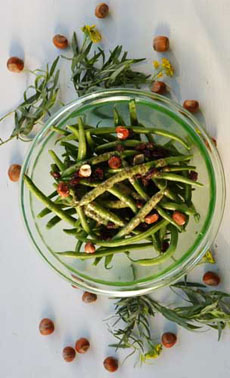
 This green bean salad is tossed with polyunsaturated grapeseed oil—not as perfect as monounsaturated fats, but still good for you. The hazelnuts in the salad are heart-healthy. Photo courtesy of Salute Santé!, a NIBBLE Top Pick Of The Week.
January 2010
Last Updated April 2013
|
 |
Good Fat
Page 2: Healthy Fat
This is Page 4 of a four-page article. Here we discuss good fats vs. bad fats. Click on the black links below to visit other pages.
Healthy Fat
Monounsaturated Fats (Good For You!)
Monounsaturated fats are part of the traditional “Mediterranean diet,” whose followers tend to have lower risk of cardiovascular disease. This group of plant oils is liquid at room temperature and turn cloudy when kept in the refrigerator. Nut and seed oils are part of this group. High-oleic fats contain more monounsaturated fat and less polyunsaturated fat.
Canola oil and olive oil, two popular cooking oils, are low in unhealthy saturated fat, and high in healthy monounsaturated fat. Scientists believe that monounsaturated fats help lower the bad cholesterol (LDL) that can clog arteries, leading to heart disease or stroke, while increasing the level of good cholesterol (HDL) that removes cholesterol buildup from the arteries. Integrate more of them, as well as the other oils listed above, into your diet.
Polyunsaturated Fats (Good For You!)
Polyunsaturated fats lower both the LDL (bad) and HDL (good) cholesterol. Consuming too much of them has also been linked to suppression of the immune system and the growth of malignant tumors in laboratory animals. However, they are still healthier than saturated fats, vis-à-vis heart disease. Polyunsaturated fats are liquid at room temperatures as well as at cold temperatures.
- Examples: Corn oil, flaxseed oil, grapeseed oil, refined olive oil, soybean oil, sunflower oil and walnut oil. Grapeseed oil is also a good source of linoleic acid, a type of essential fatty acid which, like the omega-3 fatty acids found in salmon, can’t be manufactured by the human body and must be obtained from food.
- Omega-3 Fatty Acids: The omega-3 group of fatty acids are also polyunsaturated fats. The body can’t make these fats; they must be gained via food (and omega-3 fats are found in very few foods). Omega-3s are anti-inflammatory and help protect against heart disease; ongoing studies may verify even more health benefits. Primary sources of omega-3 fats can be found in corn, flaxseed, soybean and sunflower oils, as well as in flax seeds, fish and walnuts.
- Omega-6 Fatty Acids: Omega-6 fatty acids lower LDL cholesterol (the “bad” cholesterol) and reduce inflammation; they also protect against heart disease. As with omega-3s, omega-6 fatty acids cannot be made by the body and must be ingested via food. They are present in meat, most seeds and vegetable oils, including corn, cottonseed, safflower and soybean oils.
Marine Oils (Good For You!)
Marine oils are very heart-healthy oils that should be included in a balanced diet. Marine oils contain the omega-3 fatty acids EPA (eicosapentaenoic acid) and DHA (docosahexaenoic acid). They seem to help blood cholesterol levels and may be important in preventing heart attacks and conditions such as rheumatoid arthritis and clogged arteries.
- Examples: Marine oils are found in cold-water fish such as herring, mackerel, salmon, sardines and tuna.
- These particular omega-3s are not found to any substantial degree in vegetable oils, except for canola oil, grapeseed oil and walnuts/walnut oil.
Go To The Article Index Above
Lifestyle Direct, Inc. All rights reserved. Images are the copyright of their individual owners.

|
|


